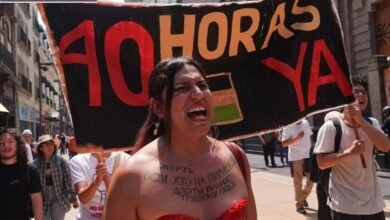Thousands flock to NZ capital in huge Māori protests

News Mania Desk / Piyal Chatterjee / 20th November 2024
In opposition to a contentious measure that aims to rewrite the nation’s foundational contract between British colonists and Māori people, nearly 40,000 people have demonstrated outside of New Zealand’s parliament. A nine-day hīkoi, or nonviolent protest, that had spread across the nation came to an end with Tuesday’s demonstration. The Treaty Principles bill makes the case that the 1840 Treaty of Waitangi, which is regarded as essential to the nation’s racial relations, should be reinterpreted and legally defined in New Zealand.
Many critics perceive it as an attempt to take rights away from Māori people. The treaty no longer represents a multicultural society, according to proponents of the amendment.Activists and other bill opponents joined the march on Tuesday. As they marched through Wellington, the nation’s capital, the hīkoi grew to one of the largest in its history, with many participants wearing Māori flag colors. It considerably outnumbered the 5,000 people who gathered for land rights in 1975, and it was twice as large as another significant hīkoi that gathered for beach and sea ownership rights in 2004.
Thomas Nash, the city’s transport chair, said the influx of hīkoi through the capital may have been the busiest morning ever for Wellington’s rail system.Thousands followed as the group entered the grounds surrounding the Beehive, the New Zealand parliament building, led by Māori Queen Ngā Wai hono i te pō. Although it is unlikely that the bill would become law, the discussions and division will go on. It will be another six months until a second reading.
“My Treaty Principles Bill says that I, like everybody else, whether their ancestors came here a thousand years ago, like some of mine did, or just got off the plane at Auckland International Airport this morning to begin their journey as New Zealanders, have the same basic rights and dignity,” Seymour, who has Māori ancestry, told .
“Your starting point is to take a human being and ask, what’s your ancestry? What kind of human are you? That used to be called prejudice. It used to be called bigotry. It used to be called profiling and discrimination. Now you’re trying to make a virtue of it. I think that’s a big mistake.”






